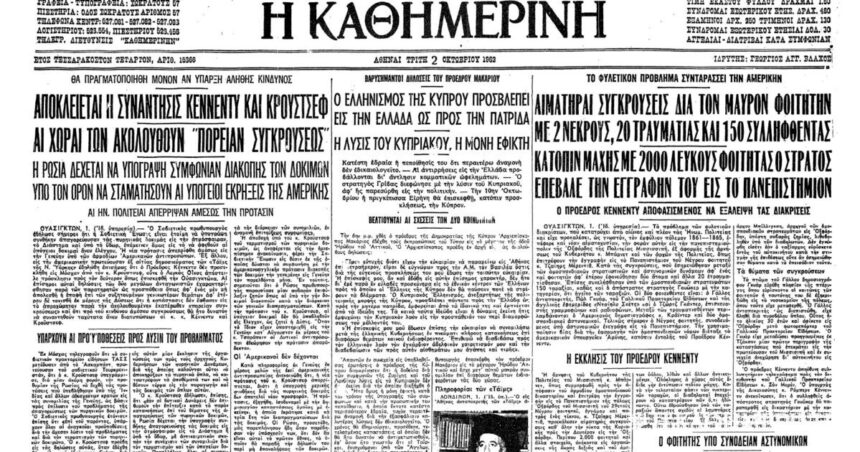“Race Trouble Shakes America,” read the front page of the “Daily” on October 2, 1962. On September 30, 1962, riots had broken out at the University of Mississippi in the city of Oxford. Participants in the episodes tried to prevent African-American James Meredith from registering. Events were so violent that President John F. Kennedy was forced to quell the uprising by mobilizing over 30,000 troops – the most ever mobilized on such an occasion.
In the wake of the 1954 Supreme Court decision, which had declared unconstitutional a law that segregated education based on color and required blacks to attend separate schools in southern states, Meredith tried to enroll at the University of Mississippi , applying in 1961. When he informed the university that he was African-American, his admission was delayed and blocked, first by officials and then by Mississippi Governor Ross Barnett. In an attempt to prevent his registration, Barnett temporarily put Meredith in jail. His future attempts to register, in which he was accompanied by federal officials, were also thwarted, and telephone conversations between President Kennedy and the governor proved fruitless. Even Attorney General Robert Kennedy got involved in trying to solve the problem, also to no avail.
On September 30, 1962, the feds escorted Meredith to try again to enroll in the university while maintaining order. But riots were not avoided. The mob, incited in part by white supremacists, attacked journalists and federal officers, burned and looted property, and seized vehicles. “The whole place […] it gave the impression of a battlefield”, characteristically wrote “Kathimerini” of October 2. Journalists, senior officers and Deputy US Attorney General Nicholas Katzenbach besieged the university’s administration building. By late morning on October 1, 27 senior officers were wounded by gunfire and two civilians—including a French journalist—were killed.
Once informed, Kennedy, invoking the Sedition Act of 1807, mobilized US Army units under Brigadier General Charles Billingsley to quell the rebellion.
According to “Kathimerini”, “the refusal of the Governor of the State of Mississippi, Mr. Barnett, to comply with the decision of the competent court and allow the registration at the University of the city of Oxford, Mississippi of the 29-year-old Negro student, married and the father of one child , Mr. James Meredith, provoked bloody clashes throughout the night of Sunday into Monday in Oxford. About 2,000 students and other elements belonging to far-right organizations and the racist American Nazi Party repeatedly clashed with federal troops and police. These had been mobilized following relevant orders from the US Ministry of Defense after President Kennedy had previously given the relevant order”. The American president had also said in a speech broadcast on television and radio that the United States is based “on the principle that the observance of the law is the best guarantee for freedom, while its violation is a source of anomalies.”
Meredith finally registered, again escorted by federal police officers, while some of his fellow students booed him, shouting “you’ve got blood on your hands” and “go home, you stinky nigger,” according to the article. However, the spokesman for the Ministry of Justice told reporters that they will not abandon him and will be by his side to protect him whenever it is deemed necessary.
The rebellion and federal crackdown was a major turning point in the civil rights movement and led to desegregation – the first integration of any public educational facility in Mississippi. Today, a statue of James Meredith dominates the campus, and the site of the rebellion has been designated a National Historic Landmark.
Column editor: Myrto Katsigera, Vassilis Minakakis, Antigone-Despina Poimenidou, Athanasios Syroplakis








